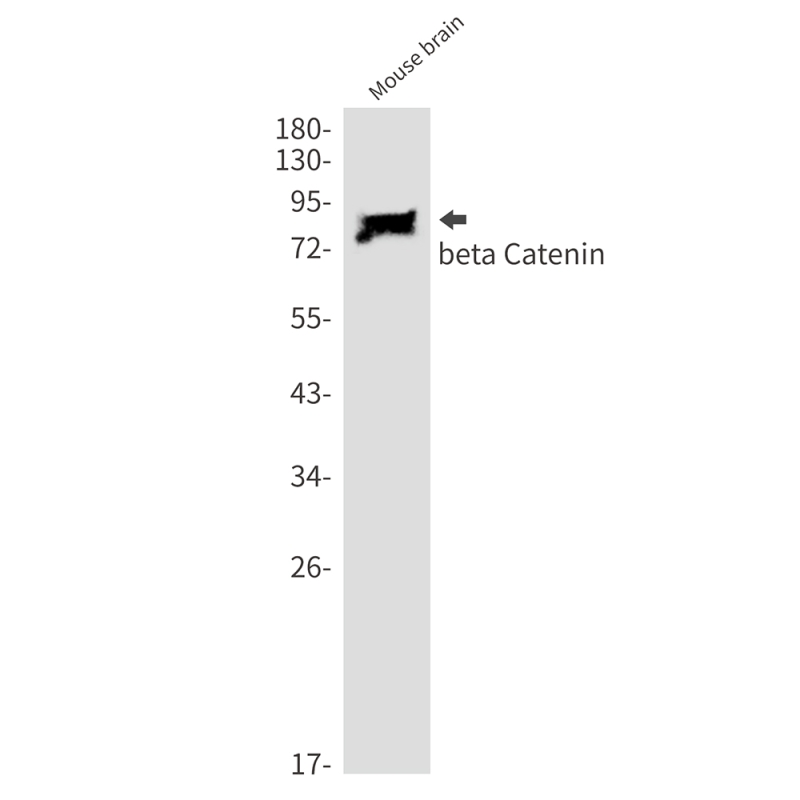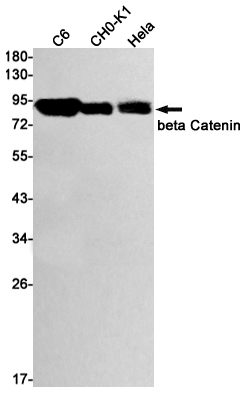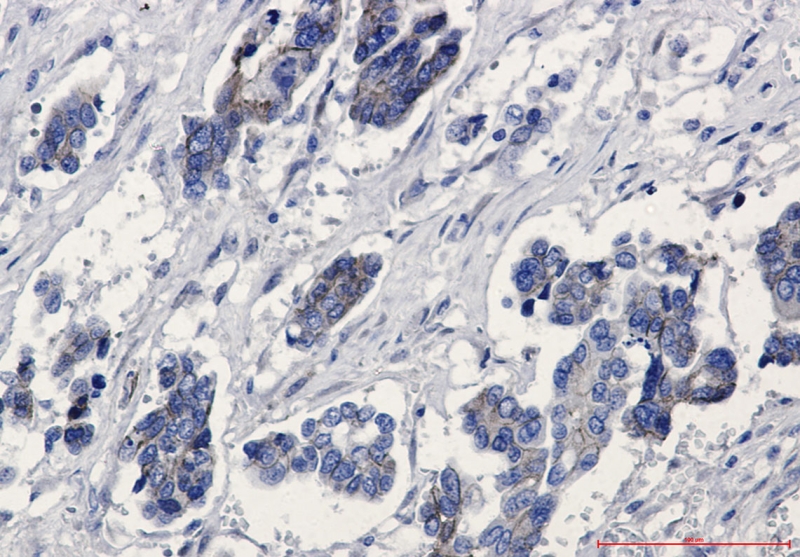


| WB | 1/500-1/1000 | Human,Mouse,Rat,Hamster |
| IF | 1/20 | Human,Mouse,Rat,Hamster |
| IHC | 1/50-1/100 | Human,Mouse,Rat,Hamster |
| ICC | 技术咨询 | Human,Mouse,Rat,Hamster |
| FCM | 咨询技术 | Human,Mouse,Rat,Hamster |
| Elisa | 咨询技术 | Human,Mouse,Rat,Hamster |
| Aliases | CTNNB1; CTNNB; OK/SW-cl.35; Catenin beta-1; Beta-catenin |
| Entrez GeneID | 1499 |
| WB Predicted band size | Calculated MW: 85 kDa; Observed MW: 85 kDa |
| Host/Isotype | Rabbit IgG |
| Antibody Type | Primary antibody |
| Storage | Store at 4°C short term. Aliquot and store at -20°C long term. Avoid freeze/thaw cycles. |
| Species Reactivity | Human,Mouse,Rat,Hamster |
| Immunogen | A synthetic peptide of human beta Catenin |
| Formulation | Purified antibody in TBS with 0.05% sodium azide,0.05%BSA and 50% glycerol. |
+ +
以下是关于beta Catenin抗体的3篇参考文献,涵盖其在癌症、信号通路及实验方法中的应用:
1. **文献名称**:*Identification of c-MYC as a target of the APC pathway*
**作者**:He TC, et al.
**摘要**:该研究利用beta Catenin抗体通过免疫沉淀和Western blot技术,揭示了Wnt/β-catenin信号通路通过APC/β-catenin复合物调控c-MYC基因表达,促进结直肠癌发生。
2. **文献名称**:*Beta-catenin regulates expression of cyclin D1 in colon carcinoma cells*
**作者**:Tetsu O, McCormick F.
**摘要**:研究使用特异性beta Catenin抗体进行免疫组化分析,发现β-catenin在核内积累可激活cyclin D1转录,阐明其在结肠癌细胞周期调控中的作用机制。
3. **文献名称**:*Monoclonal antibodies specific for beta-catenin and recommendations for epitope selection in studies of Wnt signaling*
**作者**:van Noort M, et al.
**摘要**:本文开发并验证了多种高特异性beta Catenin单克隆抗体,比较了不同表位抗体的适用场景,为Wnt信号通路研究提供了抗体选择指南,涵盖免疫荧光和ChIP等应用。
这些文献均明确涉及beta Catenin抗体的实验应用,包括机制研究、靶标验证及抗体开发,具有较高参考价值。
β-catenin antibodies are essential tools in biomedical research for studying the dual role of β-catenin in cell-cell adhesion and Wnt signaling. As a key component of cadherin-based adherens junctions, β-catenin helps maintain epithelial integrity. Simultaneously, it acts as a transcriptional co-activator in the Wnt pathway, regulating cell proliferation and differentiation. Dysregulation of β-catenin stability, often due to mutations in Wnt pathway components (e.g., APC, AXIN), leads to its nuclear accumulation and is implicated in various cancers, particularly colorectal carcinomas.
These antibodies enable detection of β-catenin's expression levels, subcellular localization (membrane-bound vs. cytoplasmic/nuclear), and activation status. Common applications include Western blotting, immunohistochemistry, and immunofluorescence. Researchers often select antibodies based on specific epitopes – some target total β-catenin, while others distinguish between phosphorylated (inactive) and non-phosphorylated (transcriptionally active) forms. For instance, the 8E7 clone specifically recognizes the unphosphorylated, stabilized form at serine 37 and threonine 41 residues.
Validation typically involves using β-catenin knockout cell lines or tissues to confirm specificity. Such antibodies are crucial for investigating Wnt pathway activity in cancer biology, developmental processes, and stem cell regulation. Recent advances have also enabled their use in multiplex assays and quantitative analyses, expanding their utility in both basic research and clinical biomarker studies.
×